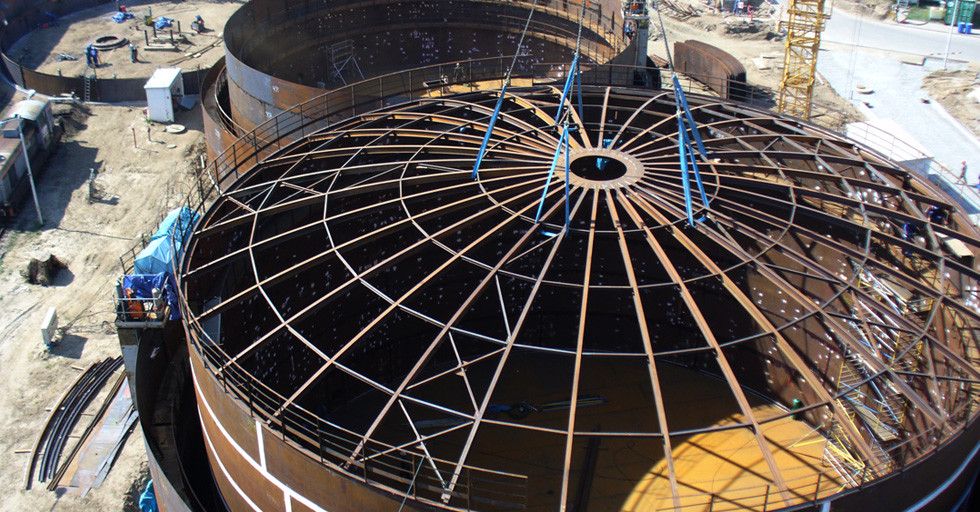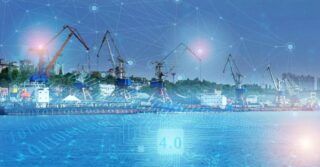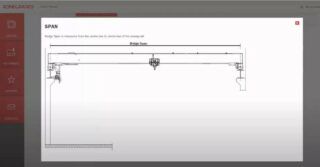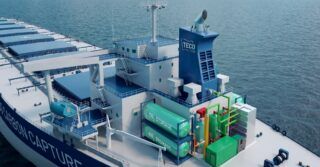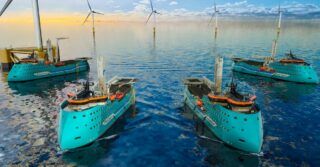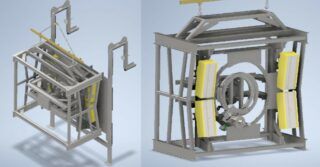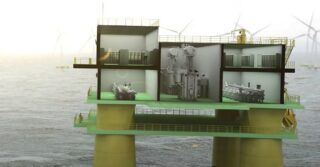KB Pomorze is a specialist engineering company dealing with the design and execution of works on the fuel, refining and petrochemical and offshore markets. It provides comprehensive turnkey industrial installations, modernization and repairs of industrial installations for the production, processing, storage and distribution of raw materials and products. He specializes in technically difficult tasks that require the creation of completely new solutions. Bogdan Kowalski, president of the board of KB Pomorze, talks about innovations, creating new devices and work standards.
For what did you receive the diploma of the Minister of Economy and the President of the Office of Technical Inspection?
Among other things, for the contribution to the development of technology towards increasing the safety and efficiency of processes, both at the construction stage and at the stage of operation of technical devices.
That is, inter alia, for the effectiveness in minimizing the risk during operation and operation of devices. Please provide examples.
One example is the method we have implemented to protect soil and groundwater against contamination with oil products stored in steel tanks with a vertical axis with a capacity of many thousand cubic meters. This technology is based on the use of a security system in the form of a geomembrane laid on the ground, under the bottom of a 2.5-meter-high, several-hundred-ton reservoir. The geomembrane is additionally equipped with a leak detection system. In recent years, we have made about forty such projects.
This is your proprietary technology or do you have more?
Another example is our method of repairing storage tanks with a capacity of many thousands of cubic meters, which have failed, e.g. due to excessive negative pressure. This very effective and safe method of repair allows for the removal of damages that is minimally invasive to the tank structure. It is much safer than the ones used so far, and the repair time does not exceed 30% of the time needed to perform it in a standard way. We have also developed the previously known technology of building large storage tanks – the foundation method. It significantly increases the safety of assembly works that are carried out from the ground level, and not at a height of even several dozen meters. The use of this method was possible thanks to the innovative, patented by us SUM actuator system.
Which is also an ecological solution.
Yes, because in the SUM system, instead of about a thousand liters of oil, the inevitable leakage of which could pollute the environment, we used water as the hydraulic fluid.
You have also developed your own fall protection system.
It is called the ZB System. It allows for securing employees at workplaces with an area of several dozen to several hundred meters. This protection is already used in several dozen locations throughout Poland. The ZB system enables safe work of people on railway cisterns at a height of 3 to 5 meters.
What is it about?
Employees are secured with personal protective equipment, in this case they are safety harnesses, suspended from a rope stretched on support points separated by up to 120 m. For comparison, I can say that companies leading in this field on the European market offer devices with support points span up to a maximum of 60 m. But to ensure safety, we also took other measures. Our engineers constructed tilting platforms providing access to the cistern with barriers, which prevent falls from a height of the cistern length up to 3.5 m. It is a unique product on the market. In addition, we have the appropriate experience and equipment to make branches on active pipelines under pressure, filled with e.g. hazardous, flammable or poisonous substances. For this purpose, we use a device called a wolverine, also of our design, which allows us to make branches with a diameter of up to 600 mm on active pipelines, without shutting them out of service.
You received the award of the Office of Technical Inspection for the high standard of technical safety for these achievements. How does the creation of such high standards look like in practice?
We are an engineering company that carries out tasks for the industry, therefore we constantly encounter complex, unusual technical problems. We are aware of the responsibility for technical safety and we educate our employees in this area. In practice, we have organized a specialized unit in the company, where specialists perform work safety analyzes, prepare instructions for the safe performance of works, risk analyzes or health and safety plans. These documents describe the method of execution and the sequence of works, the design of the instrumentation ensuring efficient and safe execution of the works, and the method of controlling the achievement of the proper quality of execution. The creation of these analyzes and documents is especially important for specialized tasks that require a non-standard approach, not described in textbooks. This is what we specialize in.
Was the expansion of the fuel base in Poznań such a textbook-free implementation?
Of course, it was a complete turnkey project. The preparations themselves included a multi-stage development of multi-discipline conceptual, construction and working designs for a difficult location. We also had to create detailed additional studies, taking into account the investor’s requirements and current regulations. Then we obtained a complete set of administrative decisions needed to start construction and started construction and installation works. Then there was a mechanical and technological start-up – measurement of operating parameters, confirmation of guaranteed parameters, obtaining a set of administrative decisions, approvals and acceptances. The entire process – from the investment concept to full operational capacity – took less than two years.
What exactly was this order about?
Our task was to modernize the existing fuel base adapted to the storage and distribution of fuels. After analyzing and determining the usefulness of the existing infrastructure, it turned out that, due to many years of operation and changes in regulations, although it is efficient, its further modernization would not be profitable. Therefore, it was completely disassembled and partially disposed of. In place of the old buildings, completely new ones were created – more efficient and compliant with the new regulations.
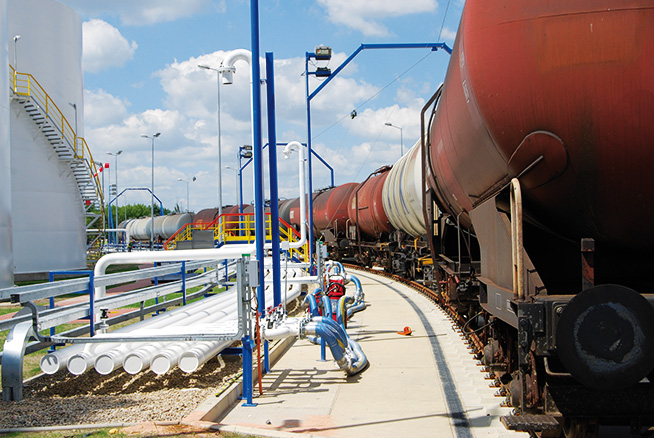
What was the biggest challenge at the time?
Already at the offer stage, it turned out that the greatest technical and organizational challenge was to locate the entire infrastructure in a very limited and irregular area. We quickly decided to involve an experienced design office. The choice fell on Biuro Inżynierskie Centrum sp.z o.o. As it turned out later, this decision was correct and resulted in a victory in the tender procedure.
But not only this decided that KB Pomorze received the contract?
In retrospect, I think that our victory in the tender was determined by the level of the concept presented – we met all the conditions expected by the investor. I mean the entire functional program enabling the achievement of commercial goals, in addition to specific and difficult terrain, while maintaining very attractive costs and deadlines. We also ensured full compliance of the designed infrastructure with applicable regulations and we took care of proper neighborly relations. So I think that the overall offer was decisive. I cannot ignore the ten years of experience of our engineering team gained on other construction sites and modernizations of fuel bases.
What technological innovations have been applied in Poznań?
Innovations are a very interesting element of our work, because they are often forced by conditions and therefore each time these solutions are different, tailored to a specific task. In Poznań, we used very slim tanks for storing diesel oils, which allowed us to significantly save space, and there was just not much space available there. Another aspect was the investor’s high expectations in terms of trade and fuel storage, which naturally forced the use of exceptionally efficient and advanced technical unloading, storage and distribution devices. In turn, the devices have been adapted to appropriate methods and tools responsible for process management, logistics and billing, including a very high degree of automation and superior control and control systems. Another challenge, perhaps the most important, was to ensure a high level of quality, safety and environmental protection.
You could say that this is your specialty.
Nevertheless, we worked a lot on this project. The base is located in an urban area, which meant that in many aspects related to emissions or fire safety, we used technologies or parameters many times more stringent than required by applicable regulations. We have built many security systems there, incl. for monitoring and signaling leakages, detecting the presence of hydrocarbons in the atmosphere, operating in the event of fire and other hazards. For this purpose, we have used a very modern and technically advanced fire protection installation and a gasoline vapor recovery installation. But these are just some of the systems we have designed. As a result, one of the most technically advanced and modern fuel bases in Europe was established. This construction was a big challenge for us and we started it with awe and a thrill, but finally ended with a feeling of success.
Has this project opened the way for similar investments?
Certainly yes. After completing the investment in Poznań, we started the modernization of the fuel terminal in Świnoujście for PKN Orlen SA, which is currently at the stage of final acceptance. Probably there will not be many more opportunities for the implementation of similar tasks, because over the last decade the construction and modernization of fuel depots in Poland has been developing very dynamically and currently the vast majority of operating depots have been adapted to the requirements, so the market is already saturated. However, we still count on the interest of companies smaller than domestic tycoons, which also operate on the wholesale fuel storage and distribution market.
You still attract investors. Which investment made you cooperate with the largest investors from Poland and abroad?
It is difficult to say, because for each of them the impulse for wider cooperation was probably something different. Perhaps for Grupa LOTOS it was the construction of an asphalt installation, or a little later an amine-sulfur complex installation under the “10+ Program”. For PKN Orlen or OLPP, it could be one of the numerous modernizations we have performed, or a significant expansion of the reloading infrastructure and storage capacity in storage and fuel depots. For foreign investors, it could be the construction of tanks in Amsterdam using the SUM system lifts, according to our own technology, or the construction of a structure with technological equipment. It would probably be easier to say that cooperation with large investors is the result of a long and consistently developed position by the company, which to a greater or lesser extent consisted of individual projects.
What are you doing now?
We are building another fuel terminal and more storage tanks. We adapt several hundred devices for filling and emptying transport tanks to the new regulations, which are located at fuel depots throughout Poland. We carry out renovation and modernization works on production installations in the refinery. We make structures for clients from the offshore industry. We also create project documentation for all these tasks. In addition, we are constantly carrying out additional small works worth several dozen thousand zlotys, where we try to meet the specialized needs of customers. It requires appropriate experience, innovation and an unconventional approach, and – as I said – we specialize in this.


